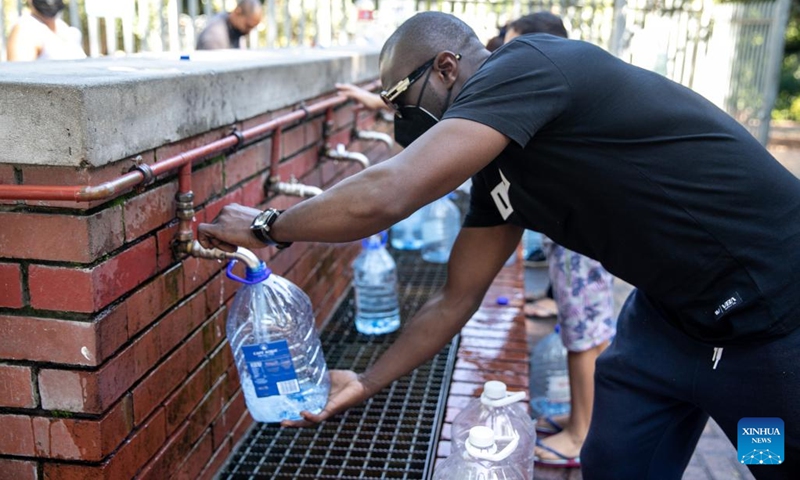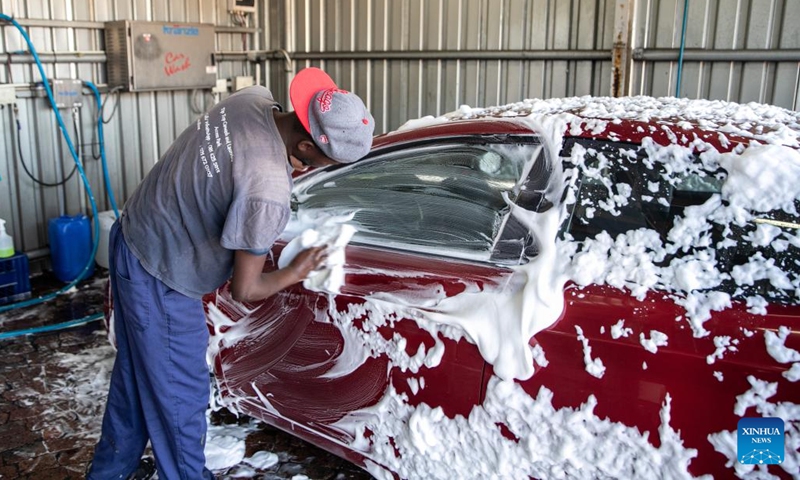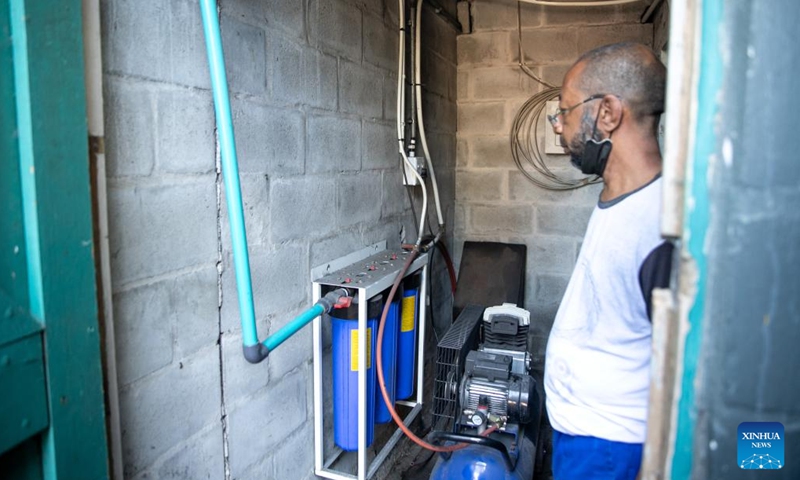
A person fills a bucket at Newlands Spring in Cape Town, South Africa, on March 19, 2022.(Photo: Xinhua)

A worker washes a car at a car wash station in Cape Town, South Africa, on March 19, 2022.(Photo: Xinhua)

A worker showcases a filter of water tanks at a car wash station in Cape Town, South Africa, on March 19, 2022.(Photo: Xinhua)
At Newlands Spring in Cape Town, Lenore Fuller, a local resident, came out Saturday morning to fill her water buckets. This is a habit she has established since 2018 when a water crisis struck and people had to queue for hours to get water as the city's taps were close to running dry.
Cape Town, South Africa's legislative capital and the oldest city with more than 3.7 million residents, in 2018 faced a difficult situation that it could be the first city in the world to run out of water after a three-year drought led to low capacity of dams that supply the city.
The water crisis reminded Fuller that she has to be mindful of the water. Her family continues to use tanks at home to collect water from the roof for non-essential uses, and fill the pool with rainwater, she said.
WAKE-UP CALL TO ALL PEOPLE
The water crisis has led to behavior changes in water use and many people are still employing water-saving behaviors nowadays, Cape Town Mayoral Committee Member for Water and Sanitation Zahid Badroodien told Xinhua in an interview at his office.
Day Zero eventually didn't arrive after the city put in place the necessary infrastructure to monitor, manage and limit water supply, promoted behavior changes, and campaigned for water-saving among tourists by using stickers, audiovisual means in tourists' hotspots, with the cooperation of residents and businesses, according to the official.
For 32-year-old resident Cerise Rabie, the water crisis woke all the people up and made them realize that they have to conserve water.
"Had we done this (conserving more water) many years ago, we might never end up there, so I think it is just like a wake-up call, but it is quite scary to be in that space when you don't know whether taps would have water tomorrow, where I'm gonna get water," she said while waiting for her car to be washed at Access Park shopping mall in Kenilworth area.
She said at home she still catches water in buckets, put water buckets outside if it rains, "trying to conserve as much water as I can."
WATER-SAVING INSTALLATIONS STILL IN PLACE
Several meters away from Rabie, two big tanks with a filter bought by the car wash service in 2018 to collect rainwater and get water from a borehole still stand. As soon as the car wash attendant uses a certain amount of municipal supply water, he switches the lever to use water from the tanks, said Achmat Abrahams, the car wash service owner.
He recalled "headache" days when his staff was forced to use the bucket and cloth to wash cars instead of machines so that they avoided using municipal water supply continuously. Despite the inconvenience, nowadays whenever possible they use the bucket and cloth method instead of sprinklers, he said.
Because of the water crisis, the car wash service became committed to saving water as far as possible.
"You know it was a such terrible time when it was 2018, 2019. And we want to make sure that it doesn't happen again here," he said. "We know and we understand that in this industry we use a lot of water. So we are in a position where we can actually do something about it."
During the water crisis Cape Town's tourism industry including hotels, guesthouses was very responsible, and they helped the city to save water, said Badroodien. In Newlands, the two-century-old Vineyard Hotel's greywater system installed after the drought spell started was still working. A sticker said the system saves up to 6,000 liters of water per day and flushes up to 190 toilets per day.
According to Chris Van Zyl, the hotel's environmental manager, this system harvests water from showers and hand basins and uses it to flush toilets. More than that, the hotel continues to use low-flow showerheads, restrict taps, use treated borehole water, he said.
"At the moment we are doing as much as we can, and we monitor the consumption of water ongoing to ensure there aren't any significant leaks," he told Xinhua.
PREVENTION OF ANOTHER DAY ZERO
Cape Town has been relying on dams and surface water for water supply, and due to good rain periods, the dams once reached 100 percent full in 2020 and 2021, meaning the city has a very safe condition in terms of water supply. Badroodien, however, believed the city can't simply rely on these sources and a lot of works and investment have been undertaken since the end of the last drought to secure additional water supplies.
"Cape Town is a water-scarce city...it would be irresponsible for me to state we don't anticipate another drought to come our way," said the senior official responsible for water.
The City's New Water Program aims to deliver 300 million liters of water per day by 2030 through groundwater abstraction, desalination and water reuse.
According to Badroodien, a proposed permanent desalination plant, whose public tender process is underway, is one of the biggest projects for the coastal city's water supply. The municipality is also looking at utilizing aquifers across the city by investing 2.6 billion rands (about 170 million U.S. dollars) into the Cape Flats Aquifer project, drilling boreholes and purifying groundwater to make them potable.
The city is also looking at water reuse, with some infrastructure being built. It plans to build a reuse plant to purify wastewater transferred from wastewater treatment facilities and bring up its quality to drinking water standards.
Many smaller projects are also taking place. On the iconic Table Mountain, the city is studying fog harvesting to establish whether it is a viable option to augment water supplies.
Badroodien was confident that the city will be ready to deal with another drought with the preparation that is undertaken while encouraging people to continue to be water-wise as they are still responsible for the water usage.
